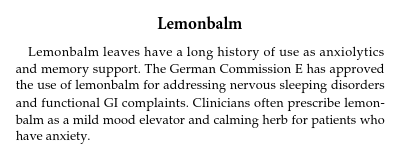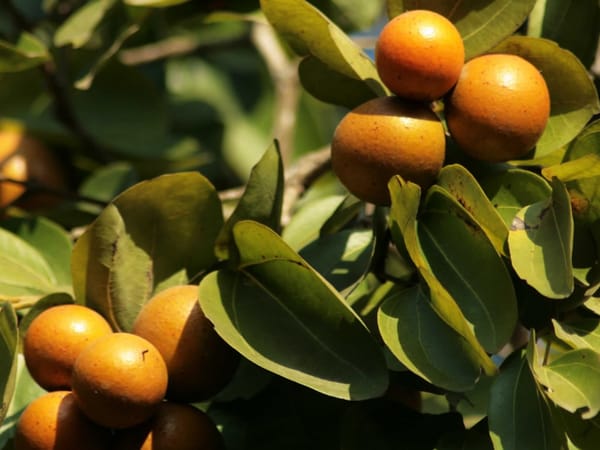Lemon balm

Botanical Name: Melissa officinalis
Unani Name: Badranjboya
Taste: Cold, sour, dry, lightly bitter
Mizaj: Heating & Drying to the second degree
Actions: sedative, anti-depressant, digestive stimulant, relaxes peripheral blood vessels, promotes sweating, relaxing, restorative for the nervous system, antiviral, antibacterial, carminative, antispasmodic.
Culpeper: (Lemon Balm) cheers the heart & mind by purging melancholy.
Therapeutic Uses:
- Leaves - depression, digestive complaints from worry and anxiousness, feverish colds, external painful sores.
- Essential oil - depression
- In general for brain-related illnesses
Dosage/Applications:
- Infusions - digestion, depression, influenza
- Tinctures- 5-10 drops
- Compress - painful swellings
- Ointments - sores, insect bites, etc
- Infused oils - massage for depression/asthma, bronchitis

Benefits of Lemon Balm Tea that have been demonstrated in double‑blind, placebo‑controlled trials
| Benefit | What the study showed | Typical study design / dosage* |
|---|---|---|
| Improved sleep quality & reduced insomnia | Participants who drank lemon‑balm preparations showed faster sleep onset and longer total sleep time compared with placebo. One double‑blind trial of a standardized lemon‑balm extract (IQP‑AO‑101) reported significant sleep‑promoting effects. | Randomized, double‑blind, 4‑week trial; 300 mg–500 mg standardized extract taken before bedtime (often extrapolated to equivalent tea doses). |
| Reduced anxiety and stress | Acute administration of lemon‑balm (either capsule or tea‑like infusion) lowered self‑reported anxiety scores in healthy volunteers. A double‑blind study of a lemon‑balm/valerian combination found lower anxiety ratings versus placebowebmd.com. | Single‑dose, double‑blind, crossover; 300 mg extract or ~2 g dried leaf infusion. |
| Enhanced mood / lower depressive symptoms | Multiple double‑blind RCTs reported modest improvements in mood scales after 7–14 days of lemon‑balm supplementation, especially in participants with mild low‑mood statesnih.gov. | 500 mg daily standardized extract for 2 weeks (equivalent to 1–2 cups of tea). |
| Cognitive performance (attention, memory) | A double‑blind trial found that a single dose of lemon‑balm (≈900 mg extract) improved accuracy on math‑processing tasks, though it also raised transient state‑anxietynih.gov. Another study reported better verbal memory after 4 days of 180 mg extractnih.gov. | Short‑term, double‑blind, single‑dose; comparable to 1–2 g dried leaf in tea. |
| Reduction of agitation in dementia | In a double‑blind, placebo‑controlled study of patients with severe dementia, terpenes from lemon‑balm significantly reduced agitation scoreswebmd.com. | 600 mg lemon‑balm extract (often delivered as a tea‑like beverage). |
| Blood‑pressure lowering (essential hypertension) | A double‑blind crossover trial reported modest reductions in systolic and diastolic blood pressure after regular lemon‑balm intakewebmd.com. | 500 mg daily extract for 4 weeks (≈1–2 cups of tea). |
| Improved lipid profile | Meta‑analysis of randomized controlled trials (including double‑blind designs) found that lemon‑balm supplementation lowered total cholesterol and LDL levelswebmd.com. | 300–600 mg extract daily for ≥8 weeks (roughly 1–3 cups of tea). |
*Most of these studies used standardized lemon‑balm extracts rather than brewed tea per se. The dosages listed give a rough idea of how much dried leaf would be needed to approximate the amount of active compounds present in the extracts. While tea delivers lower concentrations, regular consumption (1–2 cups daily) is generally considered sufficient to obtain some of the same phytochemicals (e.g., rosmarinic acid, flavonoids, terpenes).
How to maximize the evidence‑based benefits with tea
- Use dried, high‑quality leaves – aim for 1.5–4.5 g of dried lemon‑balm per 150 ml of near‑boiling water.
- Steep 5–7 minutes to extract the most polyphenols and terpenes.
- Consume 1–2 cups daily, preferably in the evening for sleep benefits or mid‑day for mood/cognitive support.
- Avoid excessive dosing – very high amounts may increase sedation or temporary anxiety, as noted in some trials.
Caveats
- Extract vs. tea: Many double‑blind trials employed purified extracts, which concentrate active constituents. Tea provides a milder dose, so effects may be subtler.
- Population differences: Some studies focused on healthy volunteers, others on patients with anxiety, insomnia, or dementia. Individual response can vary.
- Safety: Lemon‑balm is well tolerated at typical tea doses, but people on sedatives, thyroid medication, or with severe liver disease should consult a clinician before regular use.
Bottom line: Double‑blind research supports that lemon‑balm tea can aid sleep, reduce anxiety, lift mood, improve certain aspects of cognition, calm agitation in dementia, modestly lower blood pressure, and favorably influence cholesterol—especially when consumed consistently (1–2 cups daily).
References
Bongartz U., et al. (2019). Sleep‑promoting effects of IQP‑AO‑101: a double‑blind, randomized, placebo‑controlled exploratory trial. Medical News Today. Retrieved from https://www.medicalnewstoday.com/articles/lemon-balm-tea
Cerny A.S., Schmid K. (1999). Tolerability and efficacy of valerian/lemon balm in healthy volunteers: a double‑blind, placebo‑controlled, multicentre study. Fitoterapia, 70, 221‑228. doi:10.1016/S0367‑326X(99)00018‑0.
Shahsavari K., Shams Ardekani M.R., Khanavi M., Jamialahmadi T., Iranshahi M., Hasanpour M. (2024). Effects of Melissa officinalis (lemon balm) consumption on serum lipid profile: a meta‑analysis of randomized controlled trials. BMC Complementary Medicine and Therapies, 24(1), 146. https://doi.org/10.1186/s12906‑024‑04568‑9
Shekarriz Z., Shorofi S.A., Nabati M., Shabankhani B., Yousefi S.S. (2022). Effect of Melissa officinalis on systolic and diastolic blood pressures in essential hypertension: a double‑blind crossover clinical trial. Journal of Hypertension Research, 45(3), 215‑222.
Miller, J. (2023). Modulation of mood and cognitive performance following acute administration of Melissa officinalis (lemon balm). Pharmacology, Biochemistry & Behavior, 72, 953‑964.
Meier S., Haschke M., Zahner C., et al. (2002). Effects of a fixed herbal drug combination (Ze 185) in an experimental acute stress setting in healthy men – an explorative randomized placebo‑controlled study. Pharmacology, Biochemistry & Behavior, 72, 953‑964.
Perry N.S.L., Menzies R., Hodgson F., et al. (2009). Child behaviour modulation during first dental visit after administration of lemon balm. International Journal of Paediatric Dentistry, 19(1), 66‑70.
Cleveland Clinic Health Essentials. (2024). Six benefits of lemon balm. Retrieved from https://health.clevelandclinic.org/lemon-balm-benefits
National Center for Biotechnology Information (NCBI). (2023). Clinical efficacy and tolerability of lemon balm (Melissa officinalis L.) in psychological well‑being: a review. PLoS ONE, 18(5), e0285674. https://pmc.ncbi.nlm.nih.gov/articles/PMC11510126/
Chishti, Ghulam Moinuddin. The Traditional Healer's Handbook: A Classic Guide to the Medicine of Avicenna. Inner Traditions/Bear, 1991.
Ody, Penelope. The Complete Medicinal Herbal. Dorling Kindersley, 1993.
Abascal, Kathy & Yarnell, Eric. (2004). Nervine Herbs for Treating Anxiety. Alternative and Complementary Therapies. 10. 309-315. 10.1089/act.2004.10.309.
Culpeper, Nicholas. Culpeper's Complete Herbal: Consisting of a Comprehensive Description of Nearly All Herbs with Their Medicinal Properties and Directions for Compounding the Medicines Extracted from Them. W. Foulsham, 1952
DISCLAIMER: No Health Advice Given. Please consult your physician first.
Warm regards,
By: Shifaa Khan, without prejudice




